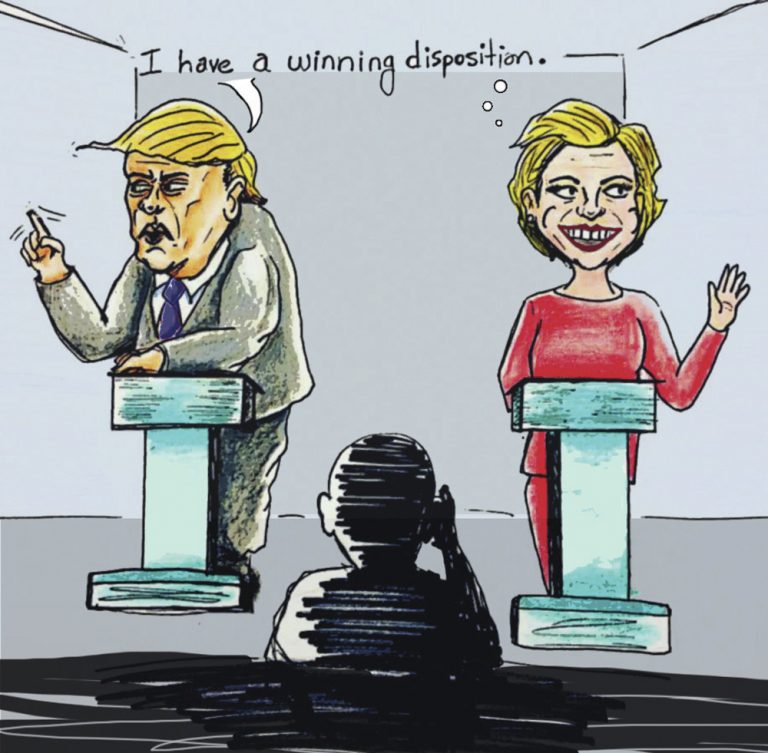
Andrew Melese
In 1960, the handsomely defined features of John Fitzgerald Kennedy appeared across stage from a dour looking Richard Nixon as the first televised debate in presidential history commenced. The debate — like this year’s first — offered mixed response of who seemed to win but generally showed the Democrat (Kennedy) faring better.
Many who listened to the Kennedy/Nixon debate on radio found Nixon the victor. Yet the television audience thought the win belonged to Kennedy. So who “won” wasn’t easily quantifiable but was clearly dependent on the medium one observed through.
In years since, this has continued to be the case. Debates have become become a mainstay of election season and a chance for the public to gain a better view — in more than one sense — of its respective candidates. They also offer the public to judge the debate’s outcome and declare who won.
Again, there lies a complication (aside from a possible change in national election polls): how can we tell who won? And furthermore, how do we define winning? If that doesn’t complicate it enough, consider that someone could easily think Hillary Clinton won and yet vote for Donald Trump. If this all sounds pointless and sheerly academic, that’s because to a large extent, “winning” a televised debate is just that.
The only real win had from a televised debate is one of the following: capturing more hearts or minds and gaining support or further impressing existent supporters and thus entrenching their commitment. Based on the change in national opinion polls since Monday evening (when the debate occurred), it seems Clinton gained more from the debate overall. However, polling organization FiveThirtyEight has each of them holding about the same chance of winning the election that they have averaged throughout the race. The odds are and have been mainly 60/40 in Clinton’s favor. So nobody seems to have won new hearts and minds, based on that information. This wouldn’t be a surprise to most who watched the debate.
Clinton — although erudite — spoke in a fairly stiff manner that conveyed some trepidation, which could be be interpreted as guilt. Her words were often delivered with difficulty that resembles stage fright.
Trump was more subdued than usual in manner, yet the absurd statements that typify him were still present: he adamantly tried to convey how it was actually Clinton that kept going on TV between 2011 and 2015 to question President Obama’s citizenship. If it was her, she found herself a remarkably well detailed Trump costume for those occasions.
The problems that both candidates have had with presentation dissipated slightly but not considerably. Clinton sounded more genuine than she has on other occasions. Her half-joking plea to fact-checkers — imploring them to correct Trump’s fallacious attacks — had a relatable and modest tone. It was as though she were trying to joke away the threat through the pleas for help with setting the record straight.
Trump, for his part, wasn’t as ferocious as he has sometimes been. During primary season, he consistently interrupted former governor Jeb Bush during one event and (now famously) called the former governor “low energy.”
Presentation improvements aside, for either candidate to have really won the debate, they would have needed to add a considerable voting block to their support, or entrench their support among existing backers. Based on what I’ve seen, neither accomplished that to much effect.
Neither showed me that they have the ability to communicate a grand vision intelligently. In 1960, Kennedy won over many moderates by emphasizing how much was at stake between the U.S. and USSR leading into the 21st century. He inspired a generation to embrace public service — and the first introduction Americans had to his seminal point of view was at the first 1960 debate.
To backtrack a bit, Trump did communicate his vision intelligently, but it’s just not an intelligent vision in the first place. Spending dozens of billions building a wall, severing ourselves from international trade deals and building up our military via massive deficit spending reminiscent of the ‘80s portion of the Cold War. Trump has communicated his grand vision well, it’s just foolish from the bottom-up.
If Clinton has a grand vision, I am unaware of it — even though I have read her book Hard Choices and plan to vote for her. She did explain that she wants the U.S. to lead the development of renewable energy, but I, like so many others, still don’t feel the passion for her as a leader that I have for President Obama.










